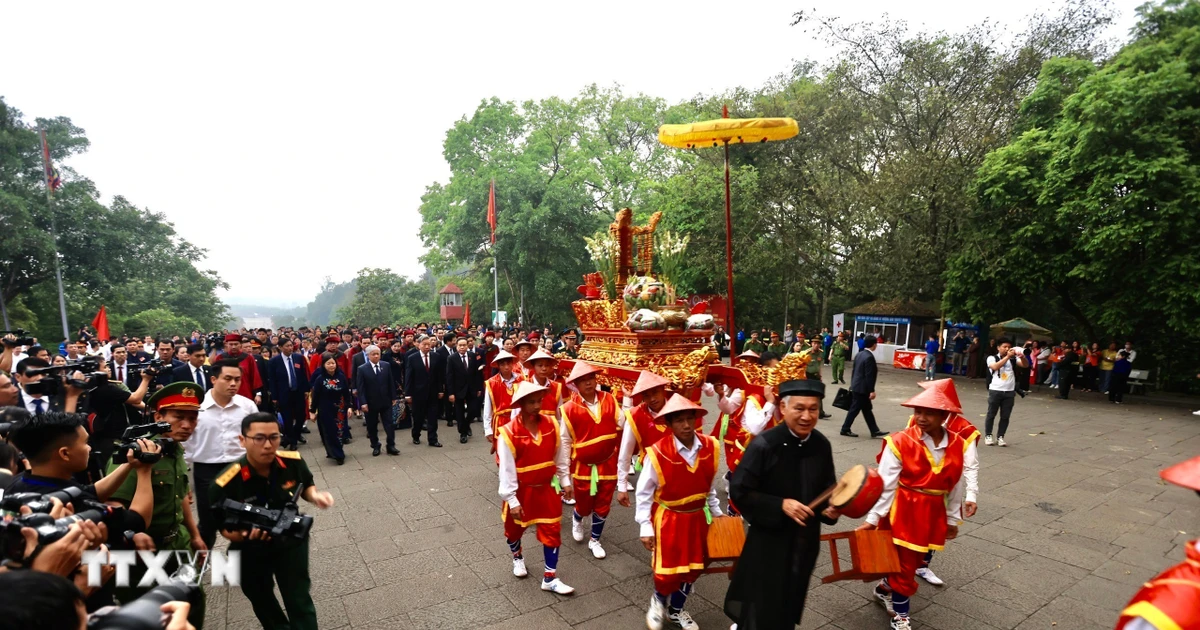Instead of having to pay social insurance for 20 years to receive a pension as at present, from July 1, the time to pay social insurance to receive a pension will only be 15 years. This is good news for many workers.
After more than 5 years of quitting her job and receiving a lump sum social insurance payment, Ms. Dam Anh T. (45 years old, living in Hanoi) has stayed home to take care of her family. Earlier this year, she applied for a job at a company specializing in the production of handicrafts.
Although her family's economy is not difficult, Ms. T. still wants to work and participate in social insurance so that when she retires, she will have an additional pension.
Ms. T. shared that currently, people who participate in social insurance only need to pay for 15 years to receive a pension, so despite her old age, she still has enough time to ensure the conditions for receiving a pension.
“Retirement benefits are more secure. I am 45 years old. If I participate in social insurance until retirement age, I will still be able to retire,” said Ms. T.

According to the provisions of the Social Insurance Law 2024, from July 1, employees who have paid social insurance for 15 years will receive pensions instead of having to pay for 20 years as currently regulated.
The 2024 Social Insurance Law provides late participants or those who participate intermittently with the opportunity to pay for 15 years to receive a monthly pension instead of having to receive a lump sum. This regulation on the minimum number of years of payment does not apply to pensioners with reduced working capacity.
Due to the reduction of the social insurance contribution period to 15 years, the minimum pension rate of 45% according to the Social Insurance Law 2014 is no longer suitable. Therefore, the Social Insurance Law 2024 stipulates a new way to calculate the pension level.
Specifically, for female workers, the monthly pension is equal to 45% of the average salary used as the basis for social insurance contributions corresponding to 15 years of social insurance contributions, then for each additional year of contribution, an additional 2% is calculated, with a maximum of 75%.
For male workers, the monthly pension is equal to 45% of the average salary used as the basis for social insurance contributions corresponding to 20 years of social insurance contributions, then 2% is added for each additional year of contributions, up to a maximum of 75%.
In case male employees have paid social insurance for 15 years but less than 20 years, the monthly pension is equal to 40% of the average salary used as the basis for social insurance payment corresponding to 15 years of social insurance payment, then for each additional year of payment, 1% is added.
Mr. Le Dinh Quang, Deputy Head of the Legal Policy Department, Vietnam General Confederation of Labor, assessed that the proposal to reduce the minimum number of years of social insurance contributions from 20 years to 15 years is a progress for workers.
Reducing the minimum social insurance payment period is a solution that brings "double benefits". This policy not only helps prevent the wave of one-time social insurance withdrawals but also helps increase the number of people participating in the social insurance system.
In particular, for the group of workers who participate in social insurance late (around 45 - 47 years old) or those who participate intermittently but when reaching retirement age have not accumulated enough 20 years of social insurance contributions, they will also receive a monthly pension.
Low pension is better than none
The social insurance policy is paid based on the contribution level. For those who have paid social insurance for at least 15 years to receive pension, the benefit rate is low.
However, when receiving pension, the benefit level will be periodically adjusted by the State. During the pension period, the Social Insurance Fund will buy health insurance, contributing to ensuring a better life in old age.
Ms. Nguyen Thi Lan Huong - former Director of the Institute of Labor Science and Social Affairs (Ministry of Labor, Invalids and Social Affairs) clearly stated that reducing the social insurance payment period to 15 years does not mean that everyone who retires will have a low salary.
This is only the minimum condition for those who enter the labor market late to have the opportunity to enjoy the pension policy. For those who participate in social insurance for a long time, nothing changes, when they reach retirement age, the benefit level will be higher.
A labor and salary expert said that in the past, many people who paid social insurance for 15 years mostly only received a one-time social insurance benefit and did not have a pension, so when they retired, most people had a very difficult life.
But from July 1, if you have participated in social insurance for 15 years and are of retirement age, you will automatically receive pension and retirement policies.
Source: https://vietnamnet.vn/tin-vui-cho-nguoi-lao-dong-45-tuoi-bat-dau-tham-gia-bhxh-van-co-luong-huu-2371184.html


![[Photo] Prime Minister Pham Minh Chinh chairs meeting after US announces reciprocal tariffs](https://vstatic.vietnam.vn/vietnam/resource/IMAGE/2025/4/3/ee90a2786c0a45d7868de039cef4a712)
![[Photo] General Secretary To Lam receives Japanese Ambassador to Vietnam Ito Naoki](https://vstatic.vietnam.vn/vietnam/resource/IMAGE/2025/4/3/3a5d233bc09d4928ac9bfed97674be98)

![[Photo] Special relics at the Vietnam Military History Museum associated with the heroic April 30th](https://vstatic.vietnam.vn/vietnam/resource/IMAGE/2025/4/3/a49d65b17b804e398de42bc2caba8368)
![[Photo] A brief moment of rest for the rescue force of the Vietnam People's Army](https://vstatic.vietnam.vn/vietnam/resource/IMAGE/2025/4/3/a2c91fa05dc04293a4b64cfd27ed4dbe)
![[Photo] Moment of love: Myanmar people are moved to thank Vietnamese soldiers](https://vstatic.vietnam.vn/vietnam/resource/IMAGE/2025/4/3/9b2e07196eb14aa5aacb1bc9e067ae6f)






















































































Comment (0)